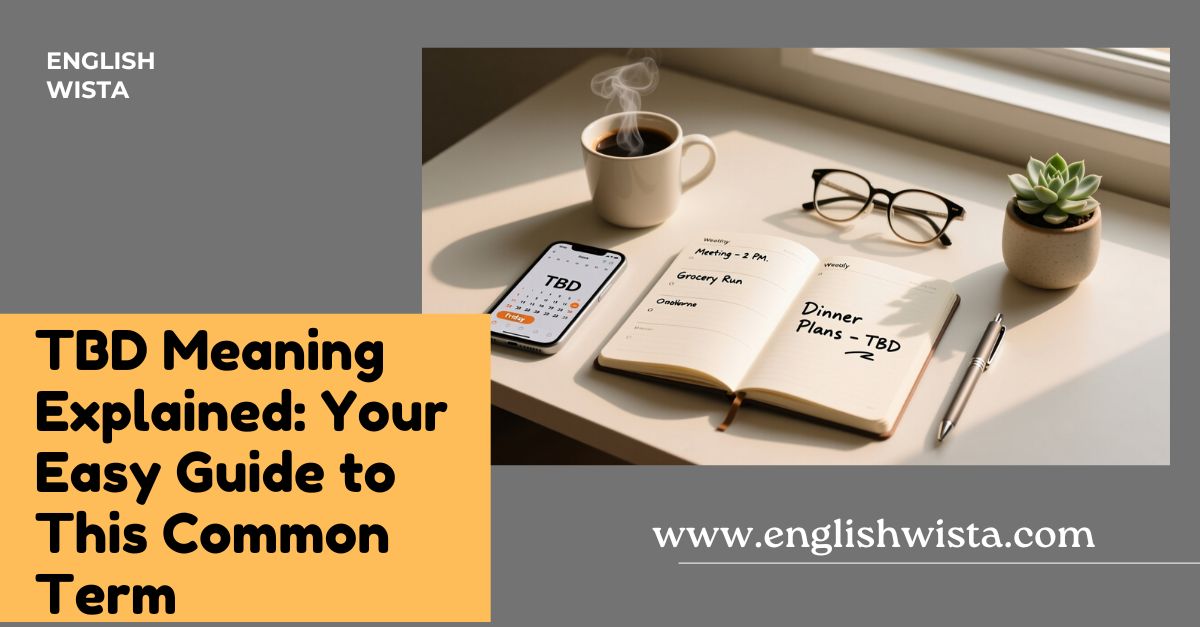Have you ever seen the letters “TBD” pop up in a message, a meeting note, or even on a calendar, and wondered what on earth it means? You’re not alone. Acronyms and abbreviations are everywhere these days, especially in texting, emails, and online chats. Some are easy to figure out, like “LOL” or “BRB.” But others, like TBD, can leave people scratching their heads.
If you’ve ever been confused, don’t worry I’ve got you covered. In this article, we’re going to break down what TBD means, how people use it in different situations, and even look at some fun facts about its origins. By the end, you’ll feel confident using and understanding TBD in your own conversations.
So, grab a coffee (or your favorite snack) and let’s take a closer look at TBD!
What Does TBD Mean?
At its simplest, TBD stands for “To Be Determined.”
It’s a short way of saying, “We don’t know yet, but we’ll figure it out later.”
You’ll often see TBD used in schedules, event plans, business emails, and even in casual text messages. It’s a placeholder a way to admit that something is undecided for now but will be decided eventually.
Here’s an easy way to think about it: TBD is like writing “coming soon” next to a detail that isn’t ready yet.
Why Do People Use TBD?
People use TBD for a very practical reason: it saves time. Instead of writing out a long sentence like “We haven’t decided on the date yet,” you can just write “Date: TBD.”
It also helps keep things organized. Imagine looking at an event calendar where some details aren’t ready yet. Instead of leaving the space blank (which could confuse people), organizers write TBD. That way, everyone knows a decision is pending.
Think of TBD as a polite way of saying, “Hang tight we’ll get back to you.”
Common Places You’ll See TBD
TBD shows up in all kinds of places. Here are some of the most common:
- Event planning:
- “Location: TBD”
- “Guest speaker: TBD”
- Business meetings or projects:
- “Deadline: TBD”
- “Next steps: TBD”
- Sports schedules:
- “Opponent: TBD”
- “Game time: TBD”
- Casual conversations:
- Friend 1: “When are we hanging out?”
- Friend 2: “TBD I’ll check my schedule.”
No matter the situation, the meaning stays the same: the decision hasn’t been made yet.
Is TBD a Word or Just an Abbreviation?
Great question! TBD is not really a “word” you’d find in the dictionary (though many modern dictionaries do list it as an abbreviation). Instead, it’s an acronym made from the first letters of the phrase “To Be Determined.”
Some people pronounce it by saying each letter “T-B-D” while others just read it in their head as “to be determined.” Both ways are perfectly fine.
Example Sentences with TBD
Let’s look at some real-life examples to see how TBD fits into conversations.
- In a work email:
- “The budget for next quarter is still TBD.”
- In a text message:
- Friend A: “What movie are we watching tonight?”
- Friend B: “TBD. I’ll decide when we get to the theater.”
- In sports schedules:
- “Playoff opponent: TBD based on tonight’s results.”
- In event planning:
- “Time: TBD depending on the guest speaker’s availability.”
Notice how each time, TBD simply takes the place of something unknown.
Is TBD Formal or Casual?
One of the cool things about TBD is that it works in both casual and formal situations.
- In formal contexts (like work reports or schedules), TBD looks professional and clear.
- In casual chats with friends, TBD is quick and convenient.
This flexibility is part of why it’s such a popular abbreviation.
Common Confusions About TBD
Some people mix up TBD with other abbreviations, so let’s clear that up.
- TBA vs. TBD:
- TBA means “To Be Announced.”
- TBD means “To Be Determined.”
- Example: If an event’s location hasn’t been chosen yet, it’s “TBD.” If the organizers know the location but haven’t shared it yet, it’s “TBA.”
- TBC vs. TBD:
- TBC means “To Be Confirmed.”
- TBD means the decision hasn’t even been made yet.
- Example: If you booked a hall for an event but are waiting for final approval, that’s “TBC.” If you haven’t chosen the hall yet, it’s “TBD.”
So, while these look similar, they each have their own purpose.
Where Did TBD Come From?
Like many abbreviations, TBD likely became popular in business and scheduling contexts. People needed a quick way to mark decisions that were pending without writing long explanations.
Over time, it spread into sports, event planning, and everyday texting. Now, it’s part of our modern communication toolkit short, simple, and easy to understand.
Fun Facts About TBD
Here are a few extra tidbits to keep things interesting:
- It’s older than you might think. TBD has been around since at least the mid-20th century in business contexts.
- Sports made it more popular. Fans often see TBD in playoff brackets when the next opponent isn’t known yet.
- It’s universal. Even though TBD is an English abbreviation, people around the world recognize it because it’s used in international business and sports.
Why TBD Is So Handy in Everyday Life
Think about how many times we don’t know all the details yet whether it’s a family dinner, a work project, or a casual plan with friends. TBD gives us a simple way to mark those unknowns.
It’s also a nice way to avoid awkwardness. Instead of saying “I don’t know” (which can sound uncertain or unprepared), you can say “TBD.” It makes things sound more professional and organized, even if the decision really hasn’t been made.
Quick Recap of TBD
Let’s reinforce what we’ve learned so far:
- TBD = To Be Determined.
- It means the decision hasn’t been made yet.
- It’s used in schedules, emails, sports, and everyday chats.
- It’s flexible works in both formal and casual situations.
- Don’t confuse it with TBA (“To Be Announced”) or TBC (“To Be Confirmed”).
Can You Use TBD in Your Own Conversations?
Absolutely! Here are a few quick examples of how you might use it today:
- With friends:
“Weekend plans are TBD, but I’ll keep you posted.” - At work:
“The meeting time is TBD depending on the manager’s schedule.” - In personal notes:
“Vacation destination: TBD.”
The next time you’re unsure of a detail, try dropping “TBD” into your message. It’s short, clear, and saves you from typing a full sentence.
Conclusion: Mastering the Meaning of TBD
So, what does TBD mean? It’s short for “To Be Determined”, and it’s your new best friend when you don’t have all the answers yet. Whether you’re planning an event, organizing a project, or just making weekend plans with friends, TBD helps you communicate clearly without over-explaining.
Now that you know the meaning and how to use it, you’ll start noticing it everywhere in emails, schedules, sports, and even casual chats. And the best part? You’ll never be confused by it again.
Next time someone asks you a question and you’re not ready with an answer, just smile and say: “That’s TBD.”



